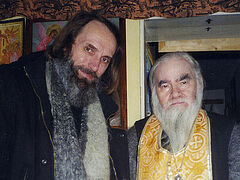Fr. Gabriel is Dean of Holy Cross Monastery in Wayne, WV, the author of Remembering Sion blog, which is “a collection of essays, sermons and commentary on Orthodox Christianity and modern world.”
 Photo: Tara Winstead / Pexels.com
Photo: Tara Winstead / Pexels.com
What is the greatest temptation for Orthodox Christians in modernity?
I would say, probably, the main temptation faced by the Orthodox Christians in the West in modernity in general is double-mindedness, in the sense of wanting to be faithful Orthodox Christians, but at the same time being able to live comfortably in the world.
I think for a lot of Orthodox Christians, there’s a sort of tension within us. There’s the faith that we received and that we want to hold on to and that we want to live in a full and authentic way. But there’s also, I think for a lot of us, this fear almost that what the world says is really true or is really correct about a number of things. So, we have in us this, I guess, cognitive dissonance. It’s a psychological term, for we don’t know how to keep both of them within us at the same time. The temptation is to compromise our faith or to ignore parts of our faith that are inconvenient for life in the modern world.
I’ve been thinking recently about the fools for Christ and how important a witness the fools for Christ are to us. In particular, the stories of some fools for Christ who would do things that at that time were very scandalous to the faithful, who would visit harlots or different places of sin. And they would be unharmed by those things because of their folly for Christ. If you or I, or most ordinary Orthodox Christians, were to engage in the kind of behavior the fools-for-Christ did, we would fall immediately into sin.
 Blessed Fools-for-Christ Mikhail and Nikolai. Photo: Anatoly Goriainov
Blessed Fools-for-Christ Mikhail and Nikolai. Photo: Anatoly Goriainov
I think we as Orthodox Christians are immersed in this extremely sinful culture, and yet we lack that disdain for the praise of the world that the fools-for-Christ possessed. I think that puts us in a dangerous situation because of our care for how others will perceive us. I think it weakens our ability to resist sin.
It all comes down ultimately to what Christ told us: You know you cannot serve God and mammon, you cannot love father and mother, or sister and brother, lands or possessions or anything else, more than you love Me. If you are not willing to take up your cross, you cannot be My disciple.
Similarly, with what the apostle says in the New Testament, that love for the world is hatred for God.
In order to overcome that double-mindedness—of course ascesis of the fools-for-Christ is unique and difficult, like any examples of the saints, but there’s something here for all of us to learn from and take inspiration from. I think first for us particularly, it is the ability to care absolutely nothing for what anyone thinks about them because they know they are seeking the will of God. And because of that firmness, of their resolve to please God alone, they were able to be in the midst of all these temptations without being harmed by them. God, I think, protected them from many things that would have been causes of downfall to you or me.
In order to overcome double-mindedness, what we need to do is to resolve first of all to not care what anybody thinks about us, whether that’s our Orthodox brothers and sisters or their family members, friends, or coworkers, whoever else that may be that we encounter in our day-to-day life. We have to be willing to suffer exactly the same kind of scorn, mockery, ridicule, that first of all our Savior suffered on the cross, then following His example, the fools for Christ suffered from their fellow-believers as well as from worldly men and women.
As long as we care about our own reputation, in the way that others perceive us, I don’t think we are going to be able to be faithful Christians living in the world. I don’t see how that’s possible. For a long time I thought it was possible, when our culture was more Christian, to live a life that was outwardly respectable and at the same time to at least to a certain measure be faithful to the Gospel commandments. I think it’s clear that our society has progressed far beyond that point.




